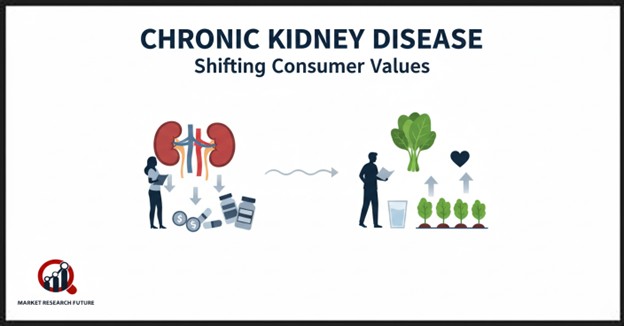Chronic Kidney Disease: Shifting Consumer Values

Chronic Kidney Disease Market Overview
Chronic Kidney Disease (CKD) is increasingly recognized as a major global health challenge, affecting millions of individuals worldwide. It refers to a group of disorders that progressively impair the kidneys’ ability to filter waste, regulate blood pressure, balance electrolytes, and maintain overall fluid homeostasis. As the prevalence of lifestyle-related conditions such as diabetes, obesity, and hypertension rises, CKD is becoming a leading cause of morbidity and mortality.
The shifting consumer mindset toward preventive healthcare, early diagnosis, and lifestyle management is driving demand for innovative diagnostic tools, personalized treatment approaches, and health-conscious diets. With growing awareness of kidney health and advancements in medical technology, the CKD market is witnessing strong transformation, emphasizing patient empowerment, holistic care, and sustainable disease management.
According to market estimates, the global chronic kidney disease market is expected to grow steadily through 2030, driven by rising disease prevalence, increased healthcare spending, and technological innovations in diagnostics, therapeutics, and digital health solutions.
What is Chronic Kidney Disease?
Chronic Kidney Disease is characterized by a gradual decline in kidney function over time. The condition affects the kidneys’ ability to filter waste and excess fluids from the blood, which can lead to toxin accumulation, electrolyte imbalance, and hypertension.
There are multiple types of CKD, including focal segmental glomerulosclerosis, diabetic nephropathy, and polycystic kidney disease. Among these, diabetic nephropathy and CKD Stage 3 (moderate kidney damage) are particularly common in North America.
CKD progression is categorized into five clinical stages, ranging from mild functional loss (Stage 1) to end-stage renal disease (Stage 5), which may require dialysis or kidney transplantation.
Key Symptoms and Risk Factors
Symptoms of CKD vary depending on the stage and severity. Early stages are often asymptomatic, making routine blood and urine tests critical for early detection. As the disease progresses, patients may experience:
- Fatigue and weakness
- Swelling in legs or ankles (edema)
- Elevated blood pressure
- Nausea and loss of appetite
- Decreased urine output
Risk Factors
CKD risk factors can be broadly categorized into:
- Non-Modifiable Factors: Age, family history, genetic predisposition, and ethnicity.
- Modifiable Factors: Diabetes, hypertension, obesity, cardiovascular diseases, smoking, and poor diet.
Addressing modifiable risk factors through preventive care and lifestyle changes can significantly slow disease progression and improve patient outcomes.
Stages of CKD and Clinical Management
CKD is classified into five stages based on the glomerular filtration rate (GFR):
- Stage 1: Mild kidney damage with normal or high GFR; often asymptomatic.
- Stage 2: Slight decline in kidney function; early signs detectable through testing.
- Stage 3: Moderate decline; symptoms like fatigue and edema may appear.
- Stage 4: Severe loss of function; treatment required to slow progression.
- Stage 5: End-stage renal disease; dialysis or transplantation necessary.
Each stage requires a specific management strategy, including blood pressure control, blood sugar regulation, dietary adjustments, and medication to protect kidney function.
Market Growth Drivers
The chronic kidney disease market is expanding due to multiple converging trends:
- Rising Prevalence: Increased incidence of diabetes and hypertension globally.
- Technological Advancements: Improved diagnostics (e.g., serum creatinine and GFR tests) and novel therapeutics.
- Consumer Awareness: Shift toward early detection and preventive care.
- Government Initiatives: Public health campaigns and reimbursement support for CKD screening and treatment.
- Personalized Medicine: Adoption of patient-specific interventions and digital health monitoring.
Challenges
Despite strong growth potential, the market faces key challenges:
- Low Awareness: Many individuals remain undiagnosed until advanced stages.
- Limited Access: In low-income regions, lack of screening and treatment infrastructure.
- High Treatment Costs: Dialysis and transplantation remain expensive for many patients.
- Lifestyle Factors: Poor dietary habits and sedentary lifestyles increase risk.
Addressing these issues through public education, affordable care models, and policy support will be crucial for improved CKD management.
Regional Insights
- North America Leads the global market, driven by high prevalence, robust healthcare infrastructure, and strong focus on preventive healthcare. The U.S. is a major hub for CKD diagnostics and treatment innovation.
- Europe has significant demand supported by government-led awareness programs and advanced clinical research.
- Asia-Pacific is the fastest-growing region due to increasing incidence of diabetes and hypertension, rising healthcare investments, and expanding medical access in countries like India, China, and Japan.
- Latin America & Middle East/Africa are emerging markets with growing awareness but challenged by infrastructure gaps and limited access to advanced care.
Future Outlook
The future of CKD management lies in integrated care models, combining preventive health, early diagnosis, personalized treatment, and digital health technologies. Artificial intelligence, wearable health monitors, and telemedicine platforms are expected to revolutionize patient engagement and disease monitoring.
As consumer values shift toward proactive health management and quality of life, the global CKD market is poised for steady growth, emphasizing patient-centric innovation and sustainable healthcare solutions.
Conclusion
Chronic Kidney Disease represents one of the most pressing non-communicable diseases of our time. However, shifting consumer awareness, technological innovation, and public health initiatives are transforming how CKD is diagnosed, managed, and prevented.
With an increasing focus on early intervention, lifestyle modification, and patient education, the CKD market is evolving toward a holistic and value-driven healthcare ecosystem, ensuring better outcomes and improved quality of life for millions worldwide.

Leave a Comment